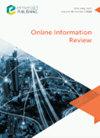Exploring the psychometric properties of the digital citizenship scale among Indian students
IF 3.1
3区 管理学
Q2 COMPUTER SCIENCE, INFORMATION SYSTEMS
引用次数: 0
Abstract
Purpose Previous studies highlighted a shortage of scale to measure digital citizenship among Indians. Accordingly, this study examined the psychometric properties of Jones and Mitchell’s (2016) digital citizenship scale in the Indian context with the help of two independent studies.Design/methodology/approach In the first study, the factorial validity of the scale was determined using the exploratory factor analysis (EFA) and confirmatory factor analysis (CFA). In the second study, Cronbach’s alpha (CA) and composite reliability (CR) values checked the internal consistency reliability of the scale. Also, convergent, discriminant and criterion validity were examined.Findings EFA recommended a two-factor structure explaining 58.219% of the total variance. The item loadings varied from 0.540 to 0.793. The Indian version of the scale showed one variation. In the original digital citizenship scale, the seventh statement (“I like to present myself online as someone was making positive choices”) was part of factor 1 (online respect); however, this study suggested that the seventh statement should be included in factor 2 (online civic engagement). In the second study, the acceptable (>0.70) values of CA and CR concluded the internal consistency reliability of the scale. The convergent validity was suggested by average variance explained values (>0.50). In addition, as expected, the Indian version of the digital citizenship scale reported a statistically significant positive correlation with Internet self-efficacy and a considerable negative relationship with cyberbullying. These findings concluded the criterion validity of the scale.Originality/value The Indian version of the digital citizenship scale showed appreciable psychometric properties among Indian students.探讨印度学生数字公民量表的心理测量特征
先前的研究强调,衡量印度人的数字公民身份缺乏规模。因此,本研究在两项独立研究的帮助下,研究了Jones和Mitchell(2016)在印度背景下的数字公民量表的心理测量特性。设计/方法/方法在第一项研究中,采用探索性因子分析(EFA)和验证性因子分析(CFA)确定量表的因子效度。在第二项研究中,Cronbach’s alpha (CA)和复合信度(CR)值检验了量表的内部一致性信度。并对收敛效度、判别效度和标准效度进行了检验。结果EFA推荐双因素结构解释总方差的58.219%。项目负载从0.540到0.793不等。印度版的量表有一个变化。在最初的数字公民量表中,第七项陈述(“我喜欢在网上表现得像一个做出积极选择的人”)是因素1(在线尊重)的一部分;然而,本研究表明,第七项声明应包括在因素2(在线公民参与)。在第二项研究中,CA和CR的可接受值(>0.70)得出了量表的内部一致性信度。平均方差解释值表示收敛效度(>0.50)。此外,正如预期的那样,印度版本的数字公民量表报告了与网络自我效能的统计显著正相关和与网络欺凌的相当负相关。这些发现总结了量表的标准效度。印度版的数字公民量表在印度学生中显示出明显的心理测量特征。
本文章由计算机程序翻译,如有差异,请以英文原文为准。
求助全文
约1分钟内获得全文
求助全文
来源期刊

Online Information Review
工程技术-计算机:信息系统
CiteScore
6.90
自引率
16.10%
发文量
67
审稿时长
6 months
期刊介绍:
The journal provides a multi-disciplinary forum for scholars from a range of fields, including information studies/iSchools, data studies, internet studies, media and communication studies and information systems.
Publishes research on the social, political and ethical aspects of emergent digital information practices and platforms, and welcomes submissions that draw upon critical and socio-technical perspectives in order to address these developments.
Welcomes empirical, conceptual and methodological contributions on any topics relevant to the broad field of digital information and communication, however we are particularly interested in receiving submissions that address emerging issues around the below topics.
Coverage includes (but is not limited to):
•Online communities, social networking and social media, including online political communication; crowdsourcing; positive computing and wellbeing.
•The social drivers and implications of emerging data practices, including open data; big data; data journeys and flows; and research data management.
•Digital transformations including organisations’ use of information technologies (e.g. Internet of Things and digitisation of user experience) to improve economic and social welfare, health and wellbeing, and protect the environment.
•Developments in digital scholarship and the production and use of scholarly content.
•Online and digital research methods, including their ethical aspects.
 求助内容:
求助内容: 应助结果提醒方式:
应助结果提醒方式:


